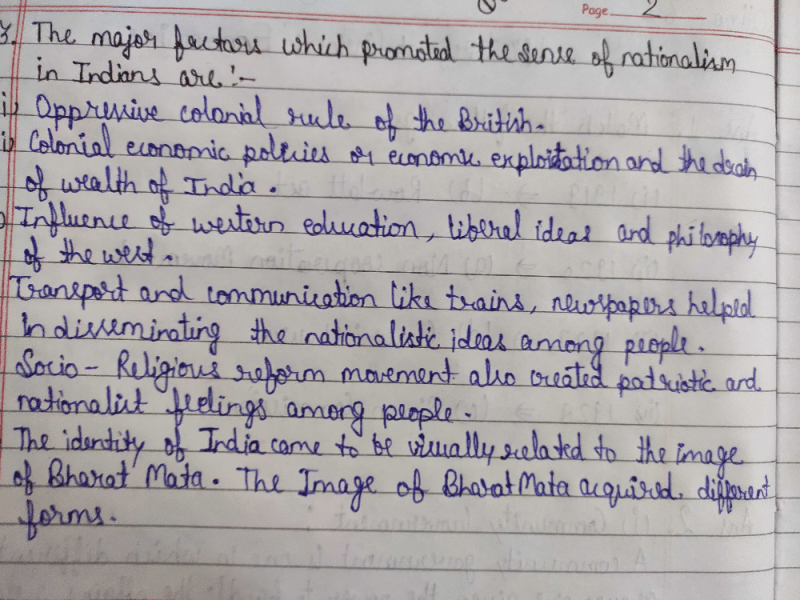Class 10 Exam > Class 10 Questions > What were the factors which promoted the sens...
Start Learning for Free
What were the factors which promoted the sense of nationalism in Indians?
Most Upvoted Answer
What were the factors which promoted the sense of nationalism in India...
Factors that promoted the sense of nationalism in Indians
There were several factors that contributed to the growth of nationalism in India, some of which include:
Socio-religious reform movements
The socio-religious reform movements of the 19th century played a significant role in promoting nationalism in India. These movements sought to reform various aspects of Indian society, including the status of women, caste system, and superstitious practices. Leaders of these movements, such as Raja Ram Mohan Roy and Swami Vivekananda, emphasized the need for unity and pride in Indian culture and heritage.
Impact of western education
The introduction of western education in India led to the spread of modern ideas and values, including liberalism, democracy, and nationalism. Many Indian intellectuals, who were exposed to these ideas, began to question the legitimacy of British rule and started demanding more rights and freedom for Indians.
Role of the press
The press played a crucial role in promoting nationalism in India. Indian newspapers and magazines, such as The Hindu and The Indian Express, became a platform for Indian intellectuals to express their views on various issues related to Indian society and politics. They also highlighted the injustices and discrimination faced by Indians under British rule.
Impact of the Indian National Congress
The Indian National Congress, founded in 1885, became the leading political organization representing the Indian nationalist movement. It served as a platform for Indians to voice their demands for greater political representation and autonomy. Through its various campaigns and agitations, the Congress mobilized Indians across the country and played a significant role in raising national consciousness.
Impact of Indian leaders
Several Indian leaders, such as Mahatma Gandhi, Jawaharlal Nehru, and Subhash Chandra Bose, played a crucial role in promoting nationalism in India. These leaders had a deep understanding of Indian culture, history, and society and used this knowledge to mobilize and inspire Indians to fight for their rights and freedom.
In conclusion, the growth of nationalism in India was a complex process that was driven by various factors, including socio-religious reform movements, western education, the press, the Indian National Congress, and Indian leaders. These factors contributed to the development of a sense of pride and unity among Indians, which eventually led to India's independence in 1947.
Community Answer
What were the factors which promoted the sense of nationalism in India...

Attention Class 10 Students!
To make sure you are not studying endlessly, EduRev has designed Class 10 study material, with Structured Courses, Videos, & Test Series. Plus get personalized analysis, doubt solving and improvement plans to achieve a great score in Class 10.

|
Explore Courses for Class 10 exam
|

|
Similar Class 10 Doubts
What were the factors which promoted the sense of nationalism in Indians?
Question Description
What were the factors which promoted the sense of nationalism in Indians? for Class 10 2024 is part of Class 10 preparation. The Question and answers have been prepared according to the Class 10 exam syllabus. Information about What were the factors which promoted the sense of nationalism in Indians? covers all topics & solutions for Class 10 2024 Exam. Find important definitions, questions, meanings, examples, exercises and tests below for What were the factors which promoted the sense of nationalism in Indians?.
What were the factors which promoted the sense of nationalism in Indians? for Class 10 2024 is part of Class 10 preparation. The Question and answers have been prepared according to the Class 10 exam syllabus. Information about What were the factors which promoted the sense of nationalism in Indians? covers all topics & solutions for Class 10 2024 Exam. Find important definitions, questions, meanings, examples, exercises and tests below for What were the factors which promoted the sense of nationalism in Indians?.
Solutions for What were the factors which promoted the sense of nationalism in Indians? in English & in Hindi are available as part of our courses for Class 10.
Download more important topics, notes, lectures and mock test series for Class 10 Exam by signing up for free.
Here you can find the meaning of What were the factors which promoted the sense of nationalism in Indians? defined & explained in the simplest way possible. Besides giving the explanation of
What were the factors which promoted the sense of nationalism in Indians?, a detailed solution for What were the factors which promoted the sense of nationalism in Indians? has been provided alongside types of What were the factors which promoted the sense of nationalism in Indians? theory, EduRev gives you an
ample number of questions to practice What were the factors which promoted the sense of nationalism in Indians? tests, examples and also practice Class 10 tests.

|
Explore Courses for Class 10 exam
|

|
Suggested Free Tests
Signup for Free!
Signup to see your scores go up within 7 days! Learn & Practice with 1000+ FREE Notes, Videos & Tests.

























